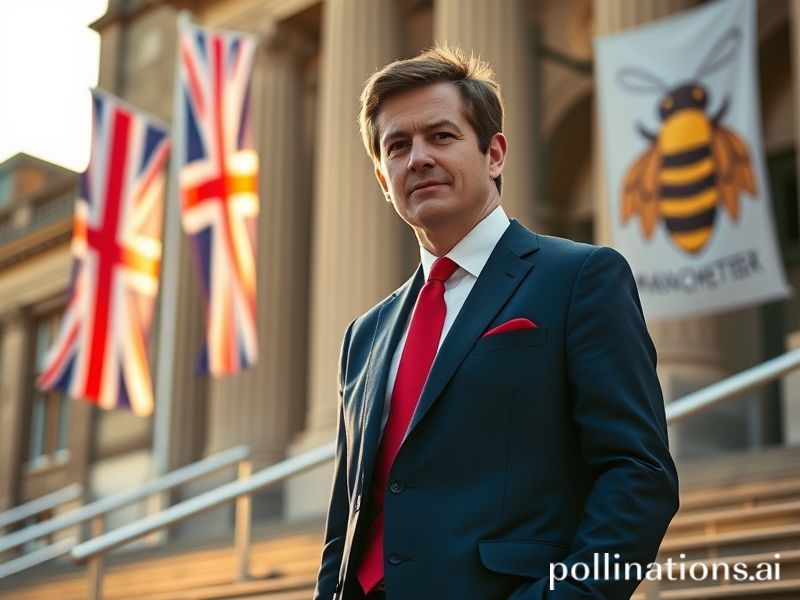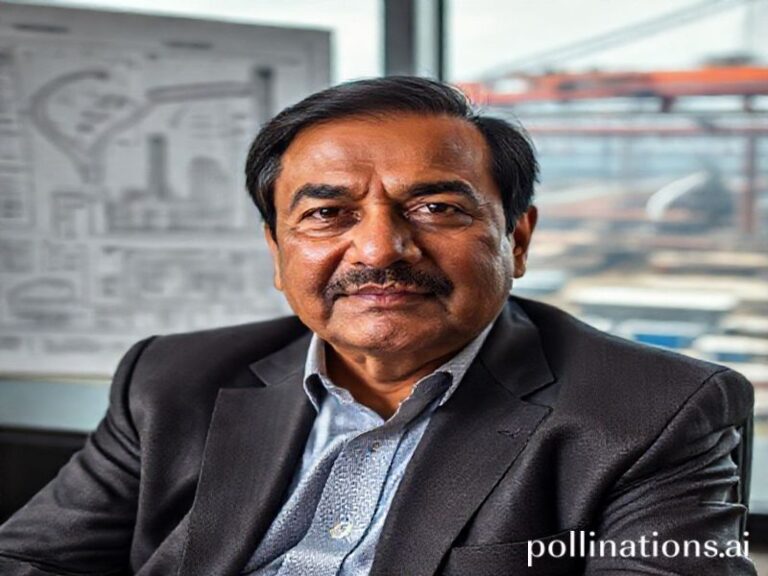Andy Burnham: The World’s Favourite Regional Rebel with a Treasury Chequebook
Andy Burnham, the self-styled “King of the North,” has spent the past decade perfecting the rare political art of sounding rebellious while still cashing Whitehall’s cheques. To the outside world, the Mayor of Greater Manchester is a municipal curiosity—somewhere between a regional mascot and a low-budget Game of Thrones extra. Yet in an era when most Western democracies can’t decide whether to implode via populism or boredom, Burnham has become an accidental global case study: how to look like a revolutionary when your biggest weapon is a PowerPoint slide on bus franchising.
From Berlin to Bogotá, city mayors are the last semi-functional layer of government. National cabinets oscillate between comic opera and hostage video; meanwhile, mayors pick up the pieces—snow, sewage, and now, spiralling inequality. Burnham knows this. He has weaponised it. After the 2017 Arena bombing, he gave the world that Churchillian soundbite about Manchester’s spirit, conveniently glossing over years of austerity that helped shred the social fabric in the first place. Still, CNN ate it up; the clip went viral in countries that couldn’t find Manchester on a map but recognised a good cathartic speech when they heard one.
Internationally, Burnham’s value lies in his branding. He’s the polite face of northern English resentment, a sort of IKEA populist: flat-packed fury with Allen-key instructions. Compare him to the shouty ethno-nationalists sulking in Budapest or the bleach-blond chaos agents marauding through Washington. Burnham offers cosmopolitan editors a comforting narrative: “See, the Anglo-Saxon world can still produce social democrats who use complete sentences.” Never mind that his actual policy toolkit—clean buses, cheaper tram fares, slightly fewer potholes—wouldn’t electrify a Swiss canton. Symbolism is cheaper than infrastructure, and considerably faster to export.
The pandemic handed him a bigger stage. When Boris Johnson’s government tried to force Manchester into Tier 3 lockdown without adequate compensation, Burnham staged a defiant press conference atop a car park, the urban equivalent of the spirit of 1940 with added drizzle. Global media swooned: here was a local chieftain standing up to a flailing metropole. South Korean television ran split-screen footage of Burnham versus Seoul’s own mayor; Kenyan pundits debated whether devolution needed a Burnham figure in Nairobi. The irony, of course, is that every pound he wrung out of Downing Street still came from the same Treasury credit card he ritually denounces. But optics travel better than spreadsheets.
Then came the buses. Last year Burnham nationalised Greater Manchester’s networks, a move that made Scandinavian transport ministers yawn and American transit activists weep with envy. Overnight, Andy became the patron saint of left-wing policy wonks who binge-read Urban Planning Reddit at 2 a.m. In Bogotá, they compared him to their own “TransMilenio” pioneers; in Paris, Anne Hidalgo sent a diplomatic emoji. Yet the average Mancunian commuter still spends 45 minutes inhaling damp polyester next to someone clipping toenails—proof, perhaps, that utopia has implementation issues.
On the world stage, Burnham illustrates a broader truth: as national governments ossify, charismatic regional barons are filling the vacuum. They can’t start wars or devalue currencies, but they can rename airports after suffragettes and impose low-emission zones that mildly inconvenience Range Rover owners. It’s governance as performance art—cheap, camera-ready, and infinitely meme-able. The danger, familiar to anyone who’s watched a TED Talk in the last decade, is mistaking narrative for delivery. Burnham’s global brand is soaring while life expectancy in parts of Greater Manchester remains lower than in parts of Romania. Even the best PowerPoint can’t resuscitate a closed A&E ward.
Still, for a planet exhausted by strongmen and strong tweets, the Burnham model offers a sardonic glimmer of hope: perhaps the future belongs to mid-tier technocrats who can quote Tony Wilson and balance a budget spreadsheet without setting anything on fire. It isn’t revolution, but in 2024 it may be the closest thing available that still fits inside a tweet thread.







